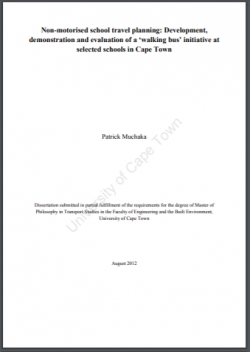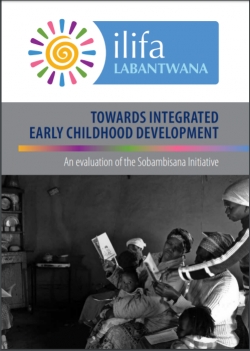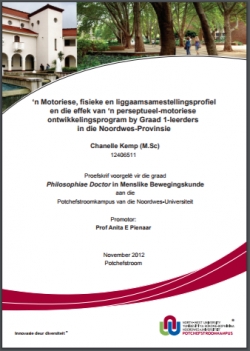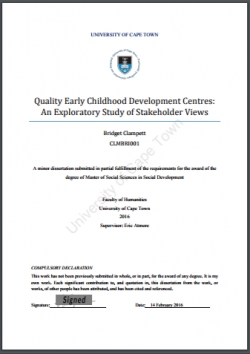Non-motorised school travel planning : development, demonstration and evaluation of a 'walking bus' initiative at selected schools in Cape Town

Type
Thesis
Authors
Category
Foundation, Intermediate
[ Browse Items ]
Publication Year
2012
Publisher
URL
[ private ]
Pages
154 p.
Subject
Primary education, Primary schools, Transport, Walking buses, Child mobility, Evaluation, Challenges, South Africa
Tags
Abstract
This dissertation reports upon research conducted at selected primary schools in Cape Town between 2010 and 2011 aimed at developing, implementing and evaluating the impacts of a non- motorised school travel intervention in the local context. The literature review conducted situated the current interest in active travel modes in the context of concerns over declining child independent mobility. 'Walking buses' were identified as the most appropriate intervention to address the child mobility concerns identified in the city. A 'walking bus' is a group of children who walk to school along a set route, supervised by adult volunteers. As part of data collection for the research, three school travel surveys were conducted using self-completion questionnaires. The first two surveys (n=1,784) were conducted at selected schools in 2010 in two neighbourhoods (Rondebosch and Delft) and were aimed at gaining insights into current learner travel behaviour and collecting the data required to implement 'walking buses'. The third survey (n=984) was conducted in 2010 and 2011, amongst schoolchildren aged 7-15 years, and their parents, and was aimed at exploring child independent mobility in the context of Cape Town and its hinterland. Key findings from the three surveys are discussed in terms of how independently mobile children are, how this varies according to neighbourhood and parent's willingness to let children use 'walking buses'. It was found that independent mobility varied considerably between wealthy and poor households, and across age and gender. Children from poorer households were heavily reliant on walking (88% share of school trips) while children from wealthier households were heavily reliant on cars (87% share of school trips). Parental interest was found to be sufficiently high to make 'walking buses' a viable intervention in both lower- and higher-income neighbourhoods. 'Walking buses' were subsequently implemented, and in the case of Rondebosch, evaluated using qualitative interviews with some of the participating children (n=16) and their parents (n=14). Key findings from the qualitative interviews are discussed in terms of learner travel behaviour prior to, and after, the setting up of 'walking buses', and insights into the impacts of 'walking buses'. The evaluation findings suggest that while scheduled 'walking buses' may be established with considerable levels of support and enthusiasm from parents and schools, they are difficult to sustain over the longer term. The dissertation concludes with a discussion on the tension between child independent mobility and 'walking buses', and implications of the findings for municipalities and schools wishing to promote greater use of walking for school travel.
Description
Thesis (MPhil)--University of Cape Town, 2012
Number of Copies
1
| Library | Accession No | Call No | Copy No | Edition | Location | Availability |
|---|---|---|---|---|---|---|
| Main | 828 | 1 | Yes |




